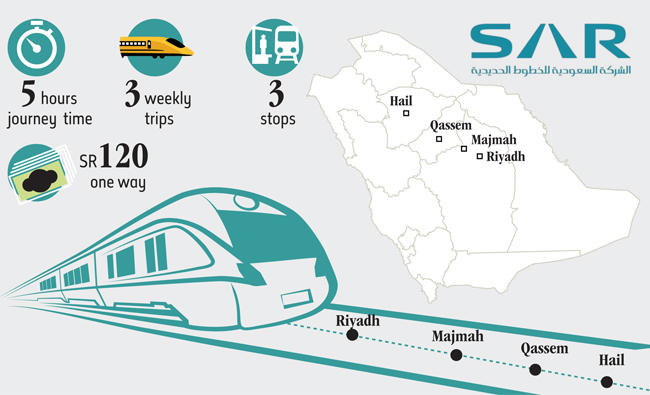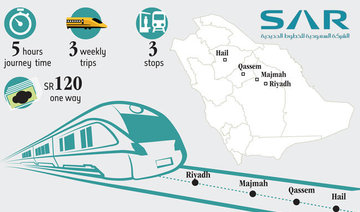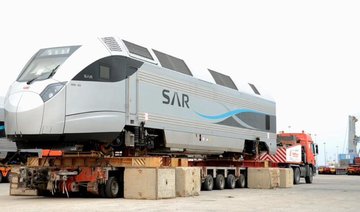JEDDAH: A Saudi Railway Company (SAR) train arrived in Hail on Saturday, making its debut trip. Hail is the fourth stop from Riyadh, with the train passing through Al-Majma’ah and Qassem. Locals welcomed the train by doing the Ardha folk dance. This service offers Hail residents a comfortable and safe option that connects them to the capital, Riyadh. SAR has also announced job opportunities in service and maintenance positions.
Ticket prices for the ride from Riyadh to Hail start from SR120 ($32), but SR60 discount can be availed by booking early through the official website.
Passengers can board the Riyadh-Hail train on Sundays, Wednesdays and Fridays.
Attendees of the opening ceremony reacted positively on various social media platforms, praising the sleek cabin design and smooth operation.
In one tweet, Raeda Hanwar described her experience on the train as if she had “stepped into a dream,” noting that the possibilities are limitless for the future.
First Saudi Railway Company train arrives in Hail
First Saudi Railway Company train arrives in Hail

Saudi Ministry of Health launches nationwide campaign to tackle obesity

- Campaign aims to target 1 million beneficiaries, bringing together several governmental, private, and non-profit entities
- GM of Lilly in Saudi Arabia Mustafa Abdul Rahman: The company supports the ‘A Nation Without Obesity’ campaign
RIYADH: The Saudi Ministry of Health launched on Thursday its “A Nation Without Obesity” campaign in Riyadh, an initiative aimed at raising awareness and combating obesity across the Kingdom.
In its initial phase, the campaign aims to target 1 million beneficiaries, bringing together several governmental, private, and non-profit entities.
“A Nation Without Obesity” was launched in response to multiple calls from Shura Council members and aligns with the Kingdom’s health transformation efforts, which have recorded notable progress toward the targets set out in Saudi Arabia’s Vision 2030.
Mustafa Abdul Rahman, general manager of Lilly in Saudi Arabia, emphasized that obesity is not a personal choice or a lifestyle issue, but a chronic disease that demands long-term management grounded in science, innovation, treatment, and prevention.
He highlighted the urgent need to shift societal perceptions and eliminate the stigma surrounding obesity, which often discourages individuals from seeking the help and treatment they need.
“The company supports the ‘A Nation Without Obesity’ campaign, which aims to raise awareness, remove psychological and social barriers, and empower individuals to access the support and treatment they need,” Abdul Rahman added.
Real transformation, he noted, starts with formal policies that back sustainable solutions and with strong partnerships between the public and private sectors.
Obesity impacts not only physical health, but also leads to a decline in mental well-being and social stability, often intensifying social isolation and reducing overall quality of life. Eliminating the stigma surrounding individuals living with obesity is therefore essential, Abdul Rahman explained.
The economic toll of obesity is equally pressing, with escalating healthcare costs linked to associated diseases and a notable decline in productivity driven by its complications — factors that cannot be ignored. For this reason, Lilly places economic impact at the core of its comprehensive strategy to combat obesity, Abdul Rahman said.
Mohammed Alghasham, CEO of Qalb Health Association, praised the campaign’s remarkable spirit of collaboration, emphasizing the strategic partnership with the Quality of Life Program and the engagement of Kayl Association for Combating Obesity as key contributors to a unified awareness effort.
“The association is committed to driving forward innovative social, awareness, and pharmaceutical initiatives while continuing to conduct studies and research aimed at enhancing existing solutions to the complex challenge of obesity, and supporting healthcare providers with insights that strengthen decision-making,” Alghasham said.
Masam Project clears more than 4,600 explosive devices from Yemen conflict in Abyan

- Operation took place on Thursday in Wadi Dufs area of Zinjibar, east of Yemen’s de facto capital Aden
- Clearance took place in high temperatures, rugged terrain of Abyan Governorate
RIYADH: Saudi Arabia’s Project for Landmine Clearance, known as Masam and launched by Saudi aid agency KSrelief, has successfully destroyed more than 4,600 explosive devices left behind from the war in Yemen.
The operation took place on Thursday in the Wadi Dufs area of Zinjibar, in Abyan Governorate, east of Yemen’s de facto capital Aden.
The project reported the destruction of 4,620 pieces of ammunition and remnants of war, including 155 projectiles, 235 combat fuses, 85 pieces of armor-piercing ammunition, 4,096 bullets, 13 anti-personnel mines, five anti-tank mines, and 31 grenades.
The Masam Project added that its efforts aimed to enhance community security and protect the lives of civilians in Yemen.
Engineer Munther Qassem, commander of the first special task force at Masam, said that the operation had been conducted in a safe area, away from residential communities and agricultural regions, ensuring full compliance with international standards.
He added: “The work of the special task teams does not stop throughout the year, given the importance of our missions in protecting the lives of innocent citizens.”
Qassem added that the team had successfully carried out the operation despite the high temperatures and rugged terrain of Abyan.
The Masam Project stands as a vital contribution to enabling a safe and dignified life for Yemenis.
KSrelief has implemented 3,438 diverse humanitarian projects across 107 countries, valued at over $7 billion, since its launch in May 2015.
Venezuelan president sends message to King Salman, affirming ties

- The Venezuelan ambassador to Riyadh, David Velasquez Caraballo, handed the letter to the Saudi Ministry of Foreign Affairs
RIYADH: President of Venezuela Nicolas Maduro has written to King Salman regarding the relationship between Riyadh and Caracas and ways in which it could be strengthened.
The written communication was handed to Dr. Abdulrahman bin Ibrahim Al-Rassi, undersecretary for multilateral international affairs at the Saudi Ministry of Foreign Affairs, by David Velasquez Caraballo, the Venezuelan ambassador to Riyadh, on Thursday. Al-Rassi is also supervisor general of the Public Diplomacy Agency at the Foreign Ministry.
During their meeting, he and Caraballo discussed ways of enhancing bilateral relations between Saudi Arabia and Venezuela, as well as other topics of mutual interest.
KAUST develops new cooling technology to improve efficiency and lifespan of solar panels

- New technology has the potential to cut down the maintenance cost of solar cells
- Experiments were conducted in cold and rainy regions of the US to test effectiveness in different climate conditions
RIYADH: The King Abdullah University of Science and Technology has made a notable research breakthrough, developing a new composite material that improves the efficiency and lifespans of the cells used in solar panels through cooling.
The new technology has the potential to cut down the maintenance cost of solar cells, according to the Saudi Press Agency. Results of the study, carried out in partnership with the King Abdulaziz City for Science and Technology, were published in the journal Materials Science and Engineering.
The study targeted the issues of commercial solar panels, which only convert around 20 percent of sunlight into electricity, while the remainder is absorbed as heat or reflected away. Other problems include high temperatures, which reduce the efficiency and performance of the cells, shortening their lifespan and demanding more frequent replacement.
This means that cooling is essential, yet traditional cooling systems such as fans and pumps consume electrical energy; passive cooling, on the other hand, requires no electricity.
Prof. Chiaochiang Gan, lead researcher at KAUST, explained that the nanomaterials used in the passive cooling process are thin substances that can be applied to multiple systems that demand cooling, such as solar cells and agricultural greenhouses, without affecting their performance.
He said that the study, conducted through the Center of Excellence for Renewable Energy and Storage Technologies, led to the creation of a material that absorbs moisture from the air at night and releases it during the day.
Covering solar cells with this material, when deployed in coastal areas of Saudi Arabia for weeks, helps keep them cool.
The passive cooling technology also helps reduce the cost of generating electricity from these cells by 18 percent.
Experiments were also conducted in cold and rainy regions of the US to test its effectiveness in different climate conditions; the results proved the technology effective in all environments.
Preliminary studies also show that other applications for the material include light-emitting devices, which typically suffer from reduced efficiency at higher temperatures.
Abdullah Al-Muqbil, researcher at the Institute of Microelectronics and Semiconductors, director of the Optics and Electronics Center of Excellence at KACST, and co-author of the study, noted that these findings also open up potential for application in lighting and laser technologies.
The research team at KAUST achieved a record-breaking performance in solar cell efficiency due to their specialized designs, showcasing the diverse expertise at the university, according to SPA.
The Center of Excellence for Renewable Energy and Storage Technologies is one of four research centers of excellence run by KAUST. It aims to support the Kingdom’s national goals in fields such as artificial intelligence, food security, renewable energy and storage technologies and smart health.
Replacement of Holy Kaaba’s kiswa completed

- Kiswa exceeds 14 meters in height and is adorned with Quranic verses embroidered with gold-coated silver and pure silver threads, written in the Thuluth script
RIYADH: The Grand Mosque in Makkah faced the dawn of the first day of the first month in the Islamic calendar, Muharram, with the kiswa-changing ceremony by the General Authority for the Care of the Two Holy Mosques, represented by the King Abdulaziz Complex for the Holy Kaaba Kiswa.
This annual event embodies the Kingdom’s commitment to serve the Two Holy Mosques — not only in organizational and administrative aspects but also on a symbolic and sacred level, given the central place the Kaaba holds in the hearts of more than a billion and a half Muslims worldwide.
They installed the embroidered curtain with gold-plated threads, the hizam (belt), the samadiah (decorative elements), lantern-shaped pieces, and decorations surrounding the mizab (rainwater spout), the corners, and other adornments, creating a captivating scene infused with feelings of reverence and supplication.
The occasion also highlights the pioneering role of Saudi youth, who form the backbone of production, supervision, and execution within the complex.
National competencies demonstrate leadership in guiding work teams, overseeing design details, and innovative technical solutions that ensure the highest standards of precision — merging exquisite craftsmanship with modern technological aspirations.
The kiswa exceeds 14 meters in height and is adorned with Quranic verses embroidered with gold-coated silver and pure silver threads, written in the Thuluth script, forming a masterpiece that demands precise engineering, care and artistic expertise to preserve its identity and quality over time.
This annual event is not merely a repeated occasion but an extension of a historical legacy established by the Founding King Abdulaziz — and reinforced by King Salman and Crown Prince Mohammed bin Salman. It is part of the national vision centered on serving the Two Holy Mosques and enhancing the quality of services provided to pilgrims and other visitors.
Every year, the ceremony to change the kiswa is a memorable scene in the collective memory of the Islamic nations and a living symbol of how the care for the holy sanctuaries has evolved from a responsibility into a leadership role.




















